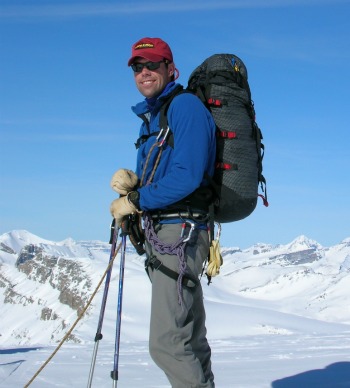
Dr. Zac Robinson is an archival historian with a deep love of the human history of the Canadian Rockies and Columbia Mountains
Every mountain is much more than ancient granite or snowy grandeur set in a picturesque landscape. With millennia in their wake, each bears a mother lode of stories of humankind's travels and travails, unsung heroes, intrepid explorers and mountain dwellers, and fortunes won and lost. Some are love stories, some are tales of valour, others are of loss and disillusion.
And it's these stories - particularly the human, forgotten and neglected stories - that rivet archival historian Dr. Zac Robinson, the Faculty of Physical Education and Recreation's newest researcher.
A long-time mountaineer of Métis heritage, Robinson focuses on the little-told and shrouded histories of those who explored the Canadian Rocky Mountains and the Columbia Mountains, the two most significant of Canada's mountain ranges.
"I'm primarily interested in the stories that get pushed to the periphery," says Robinson. "Western Canadian history has for too long neglected the mountains, primarily I think because it's where people went to play and not settle. So much of its human history needs retrieving and careful positioning within larger western and Canadian histories."
And while he admits that there's a robust history of the mountain parks in Canada, much of it he says has been shaped by tourism industries, leaving less commercially appealing histories marginalized or in some cases silenced. "Consider, for example, Aboriginal investments in these areas. It's not uncommon to see totem poles in parks or Native knickknacks and souvenirs for sale on main street; such imagery fits with popular urban ideas of nature and wilderness. And it is in this sense that Indigeneity is everywhere in our mountain parks. But at the same time it's nowhere. How many people know that Aboriginal residents were forcefully removed from these places that we so quickly celebrate as 'pristine' and 'untouched'? It's incredibly cruel when considered from the perspective of those peoples who once called Jasper, for example, home. It's these sorts of perspectives, these histories that continue to drive my interests in these landscapes."
Presently Robinson's at work on an edition of writings by Austrian Conrad Kain, arguably one of the most famous and admired of mountain guides in twentieth century Canada. But it's not the story of Kain's feats as a guide or mountaineer that Robinson is interested in, it's the personal story of the working-class guide revealed in 142 letters written by Kain between 1906 and 1933 to his lifetime friend, Amelie Malek, who kept each one, then, after his death in Canada in 1934, painstakingly typed them out.
"The letters were lost during the Second World War, when Vienna (where Malek lived) was sacked, but they resurfaced and were recovered," according to Robinson, who says the tale of the letters themselves, their loss and recovery, is as captivating as the man revealed in the letters. "They've survived multiple ocean crossings, Nazis and burning buildings, and even the 2004 tsunami in Thailand, where they were being reviewed by a vacationing historian before being sent to Canada. He apparently waded to safety with them in his arms in waist-high water," says Robinson.
Eventually the Whyte Museum of the Canadian Rockies acquired them and Robinson leapt at the opportunity to glimpse a rare view of Kain's life, told in his own words. "They are deeply personal, at times heart-wrenching and they're incredibly descriptive," says Robinson. "This is a valuable contribution to the literature on early tourism and recreation in western Canada, because it's from a perspective rarely recorded, rarely preserved and rarely understood."
Robinson hopes the edition will be published in time for the 2013 celebrations of the 100th anniversary of Mount Robson Provincial Park, where Kain is most famously remembered for first ascending the highest peak in the Rockies, Mount Robson, in 1913.
Robinson's own interest in the mountains came via a master's degree in anthropology before embarking on doctoral studies to examine the history of mountaineering in Canada. "Growing up in lake-country Ontario, I first came to mountains and mountaineering through its literature, through books. And by the time I permanently moved out West in the late 1990s, I was already hooked on all things (related to) mountains." Today he's the ACC's vice president of activities, and co-manages the club's flagship operation, the General Mountaineering Camp, which has been held annually each summer in the remote backcountry of the Rockies and Columbias for over 100 years.
This fall, he'll bring his passion for the history of sport, recreation and tourism to the classroom where he'll teach two second year classes: one on the principles of tourism (RLS 263) and another on the history of leisure and sport in Canada (PERLS 204).
As for future research, Robinson says there's no shortage of inspiration and opportunity. "Post-colonial theorists and writers have challenged us in the twentieth-first century to look at history by connecting culture and empire, geography and literature. Bringing the history of the Rockies and the Columbias into this larger network of relationships has preoccupied me up to now, and I'm still a long way from the top."